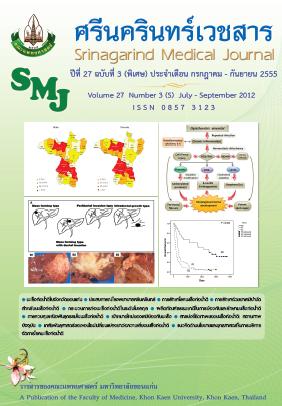Pharmacogenetics of Drug Metabolizing Enzymes in Association with Cholangiocarcinoma Risk
Abstract
Cancer of the bile duct in populations of the Mekongbasin has been recognized to be associated with liver flukeinfection. However, other factors may also play importantroles in relation to the high prevalence of cancer inpopulations of this region. Drug metabolizing enzymesare important in detoxifying toxic chemicals includingcarcinogenic agents. However, the enzymes can playanother role in activating chemicals into more toxicmetabolites. A large variation of activity of drug metabolizingenzymes is usually due to polymorphism of genesencoding these enzymes. The defective or variant allelesof drug metabolizing genes may modify the risk ofcancer in people who expose to carcinogenic agents. Drugmetabolizing genes mentioned in this review have beenreported to be associated with cholangiocarcinoma risk. Thegenes included CYP1A2, arylamine-N-acetyltransferase-1(NAT1) and NAT2, NADPH-quinone oxidorecutase-1(NQO1), glutathione-S-transferase M1 (GSTM1), GSTT,GSTO1 and methylenetetrahydrofolate reductase(MTHFR). The variant alleles which have been reportedto cause an excessive risk include: CYP1A2*1F, GSTT1null, GSTO1 and MTHFR 677C>T, whereas, slow NAT2and NQO1*2 show to decrease the risk and NAT1variants and GSTM1 null show no effect. These genesmodify cancer risk probably by alterations of themetabolism of carcinogenic compounds from food andenvironment.Downloads
How to Cite
1.
Kukongviriyapan V, Prawan A. Pharmacogenetics of Drug Metabolizing Enzymes in Association with Cholangiocarcinoma Risk. SRIMEDJ [internet]. 2013 Aug. 23 [cited 2026 Feb. 25];27:413-21. available from: https://li01.tci-thaijo.org/index.php/SRIMEDJ/article/view/11167
Issue
Section
Review Articles




